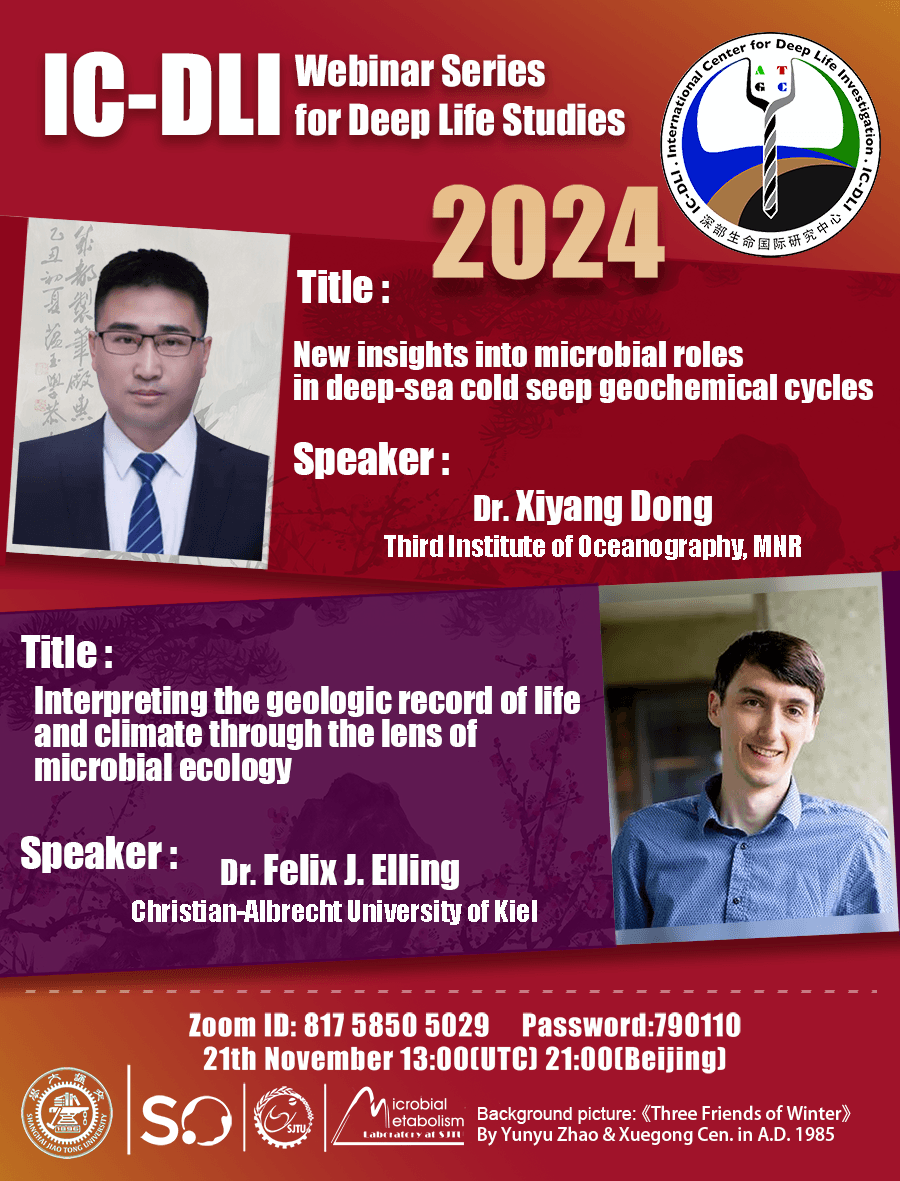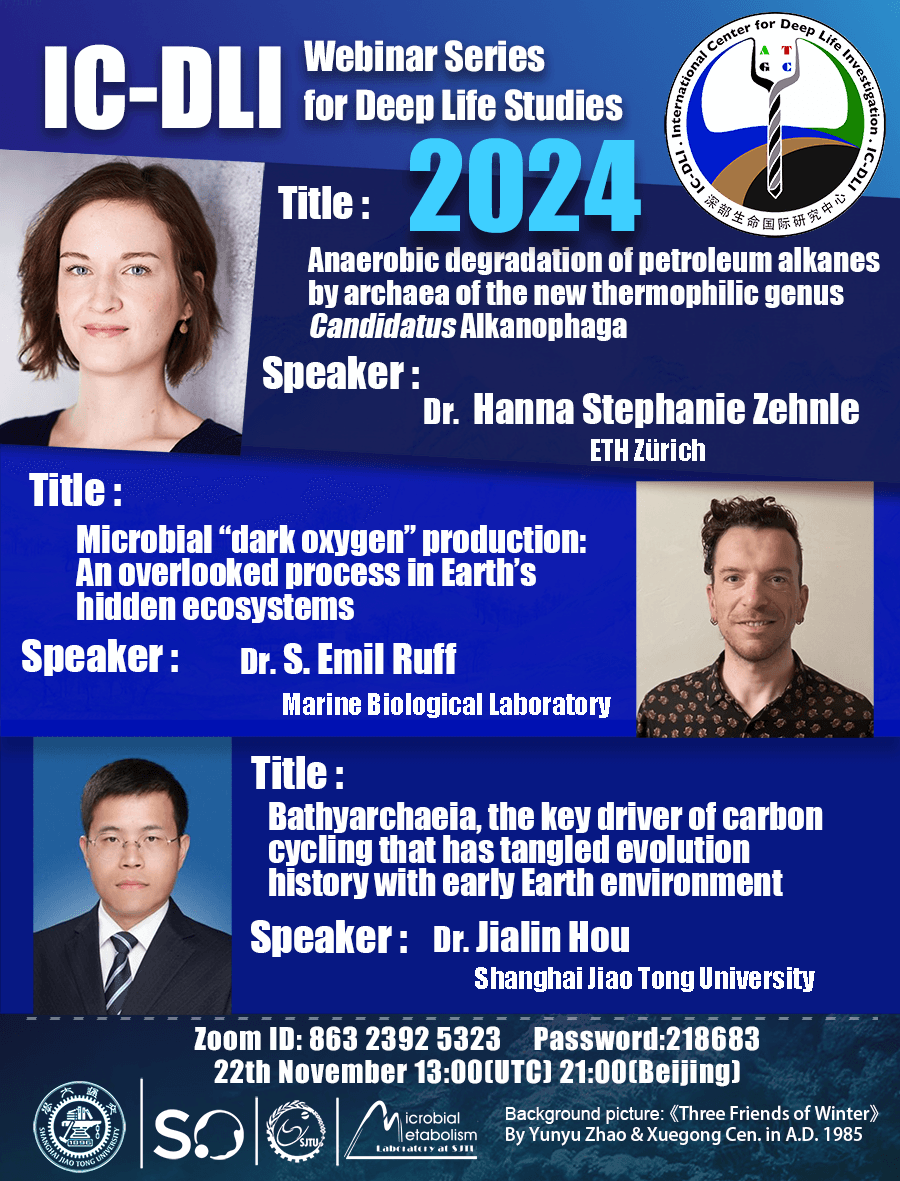From the winners of "Deep Life Paper” and "SiYuan-Ocean Emerging Leader" Awards in 2023
2024 IC-DIL Webinar
I Webinar of 2023 "SiYuan-Ocean Emerging Leaders"
Time: 21th November 13:00(UTC) 21:00(Beijing)
ZOOM ID:817 5850 5029
Passcode:790110
ZOOM link: https://us06web.zoom.us/j/81758505029?pwd=U206o9tz6bNd48hdKUQtjPHtaBpQOd.1
Speaker:Dr. Xiyang Dong, Third Institute of Oceanography, MNR
Title:New Insights into Microbial Roles in Deep-Sea Cold Seep Geochemical Cycles
Abstract:This talk examines deep-sea cold seeps as critical biogeochemical hotspots, emphasizing microbial roles in carbon, nitrogen, and phosphorus cycling. Recent findings reveal dehalogenation as a core process and significant nitrogen transformation, alongside a microbial-virus "arms race" that supports ecosystem stability. These insights advance understanding of global biogeochemical cycles and climate impacts.
Speaker:Dr. Felix J. Elling, Christian-Albrecht University of Kiel
Title: Interpreting the geologic record of life and climate through the lens of microbial ecology
Abstract:Lipid biomarkers produced by marine microbes can be preserved for millions of years in sedimentary rocks. Interpreting this record of past life requires a thorough understanding of microbial ecology. In this talk I will highlight how studying modern microbial ecology enables a comprehensive understanding of changes in past climate and ocean biogeochemistry.
II Webinar of 2023 "Deep Life Paper"
Time: 22th November 13:00(UTC) 21:00(Beijing)
ZOOM ID:863 2392 5323
Passcode:218683
ZOOM link: https://us06web.zoom.us/j/86323925323?pwd=sy192T1ClT5DYTmDY8Dr5hIwI7vRva.1
Speaker:Dr. Hanna Stephanie Zehnle, ETH Zürich
Title:Anaerobic degradation of petroleum alkanes by archaea of the new thermophilic genus Candidatus Alkanophaga
Abstract:Petroleum-rich deep-sea sediments can serve as an analogue for deeply buried petroleum reservoirs. Here, we enriched anaerobic archaea of the novel genus Candidatus Alkanophaga from petroleum-saturated and heated sediment from the Guaymas Basin (Gulf of California, Mexico). Ca. Alkanophaga use divergent methyl-coenzyme M reductases to oxidize petroleum-range alkanes at 70 °C, coupled to sulfate reduction in a novel Thermodesulfobacterium species. These consortia might mediate petroleum degradation in yet unexplored heated petroleum reservoirs.
Speaker:Dr. S. Emil Ruff, Marine Biological Laboratory
Title:Microbial “dark oxygen” production: An overlooked process in Earth’s hidden ecosystems
Abstract:Microorganisms can produce molecular oxygen in the absence of light via the dismutation of nitric oxide or chlorite. Microbiological and geochemical analyses suggest that this “dark oxygen production” occurs in many, globally widespread subsurface environments. The discovery challenges our current understanding of the evolution, ecology, and biogeochemistry of the subsurface biosphere.
Speaker:Dr. Jialin Hou, Shanghai Jiao Tong University
Title:Bathyarchaeia, the key driver of carbon cycling that has tangled evolution history with early Earth environment
Abstract:Here, my works firstly focus on illustrating the taxonomic and carbon metabolic diversification of Bathyarchaeia among different lineages based on the largest genome dataset to date. Further field investigations and modeling demonstrated that Bathyarchaeia could actively degrade recalcitrant organic matters, likely for maintenance, along with great contribution to the carbon cycle in the deep subsurface. Moreover, molecular dating analysis indicates that the origin and early diversifications of Bathyarchaeia might be driven by contemporaneous tectonic activities. Notably, one lignin-degrading clade probably contribute to the sharply decreased carbon sequestration rate at the Late Carboniferous period.




 loading......
loading......